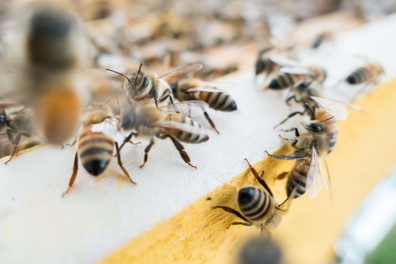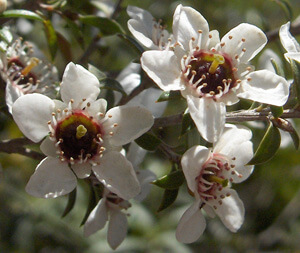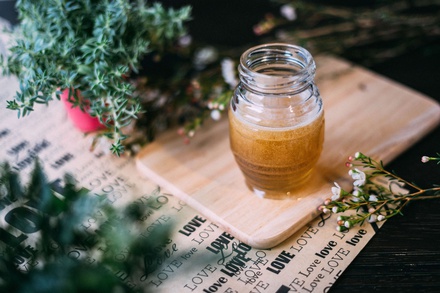We are in the midst of a very interesting period: a return to traditional medicine, self-healing and the use of treatments directly from nature.
After a brief fantasy of all-powerful pharmaceuticals, antibiotic therapy and fancy medical technology, we return to the subtle principles of nutrition, healthy living and natural medicine.
These two paradigms should not be opposed to each other. Instead, we should see them as complementary systems that can help us effectively achieve optimal and sustainable health.
Medical sciences provide us with the tools to prove the reality of "home remedies" and "alternative treatments". Healing tools and practices that used to require faith to be recognized are now proven by rigorous scientific testing.
A perfect example is honey which has been touted since ancient times as a healing agent with multiple uses. It was used as a healing dressing on wounds until the beginning of the 20th century when antibiotics came under the spotlight.
At that point, the honey was demoted to the stage of alternative remedy and replaced in common practice by manufactured antimicrobial agents.

But honey is making a comeback!
With increasing antibiotic resistance, ailing healthcare systems, and a well-founded distrust of Big Pharma comes the hopeful search for simpler, more viable, and more effective methods.
The honey has gained a loyal following and for good reason.
It is rich in nutrients, antioxidants and antimicrobial agents that fight bad bacteria, improve the immune system and work wonders as a topical agent on wounds. (1)
It is antifungal, anti-inflammatory and also works on the balance of the intestinal flora and the stomach.
All honeys are not equal
While a good number of studies have been done on all kinds of honey, the one that dominates is the Manuka honey.
Manuka honey is made from the shrub of the same name growing, wild, in New Zealand. It is better known as Tea Tree. It has an impressive array of antiseptic and healing components, some of which we are not yet familiar with.
Its potential as a natural antibiotic is profound: this magical and exotic honey kills more than 250 different strains of bacteria, including MRSA (Meticillin-resistant Staphylococcus aureus) and other highly resistant pathogens. (3)
Best of all, it has been shown to work as well as conventional antiseptics in the fight against the full range of infectious microorganisms.
Its effectiveness as a topical agent is particularly pronounced. It can be used for the healing of wounds, theacneskin rashes, burns and ulcers. Some research has even shown that it is as effective as chemical mouthwashes in reducing plaque. (4)
Many people have even reported experiences of miraculous healings through the use of Manuka honey to treat warts and MRSA wounds :
"This honey was suggested for my young son's warts. He had eczema as a baby and the rapid spread of warts is common to people with eczema. Last time, he had more than 25 warts on both hands. We tried everything to get rid of them, from over-the-counter products to several visits to the doctor to "freeze" the warts. Nothing worked. Finally, a plastic surgeon recommended this honey because of its success on patients with eczema and psoriasis. After a week of using Manuka Honey, the warts were noticeably smaller. Now the warts are gone! It's a miracle! "
"My mother contracted MRSA from a pressure ulcer in a hospital. No amount of antibiotics could get rid of it, it kept coming back and the eschar kept getting worse. We purchased Manuka honey and began applying it to the wound and any MRSA wounds. The next day, there was significant improvement in all wounds. Now, after 5 days, the pressure injury is almost completely healed and the MRSA has not returned as it did on a daily basis. All that remains is a beautiful skin, without any wounds or redness. It's a miracle! "
The "Food and Drug Administration" has even officially approved Manuka honey dressings, giving it credibility and keeping it off the "traditional" medicine bench.
But before you rush out to try this sweet panacea, be warned: the buzz surrounding Manuka honey has sent health food retailers into a bit of a frenzy.
Because of this, not all Manuka honeys are as high quality as they should be. As a result, finding the honey that will work best will give you some extra work.
Uniqueness" is the key to finding the best Manuka Honey

We still don't understand how manuka honey works so well on bacteria and, unfortunately, this lack of knowledge leaves the door open to many claims.
However, there is a name for its super-powerful bactericidal ability: Unique Manuka Factor or UMF.
Here's what you need to know: manuka honey is good quality when it has a UMF rating of 10 or higher.
Products with this ideal UMF rating contain higher levels of antibacterial components that are not broken down by catalase enzymes and make them much more potent than any other type of honey.
The best Manuka honeys should be thick in consistency and light in color, and they should be identified by the "UMF quality trademark," a cute little logo that can only be used by manufacturers who meet the strict criteria set by the "Unique Manuka Factor Honey Association (UMFHA)."
If a product does not have all of these features, avoid it. Remember, you can always ask for a company's testing and certifications before you buy honey from them.
Low-quality products have created controversy around Manuka honey, since some of them cannot stand up to the scrutiny of clinical testing. As long as you work with a high UMF product, it will meet or exceed your expectations.
Combined with a healthy diet and lifestyle, honey from Manuka is a wonderful alternative to chemical antiseptics and mouthwashes and an excellent natural remedy for total well-being.
Sources:
1 http://www.ncbi.nlm.nih.gov/pmc/articles/PMC3609166/
2 http://www.naturalnews.com/035959_manuka_honey_healing_medicine.html



